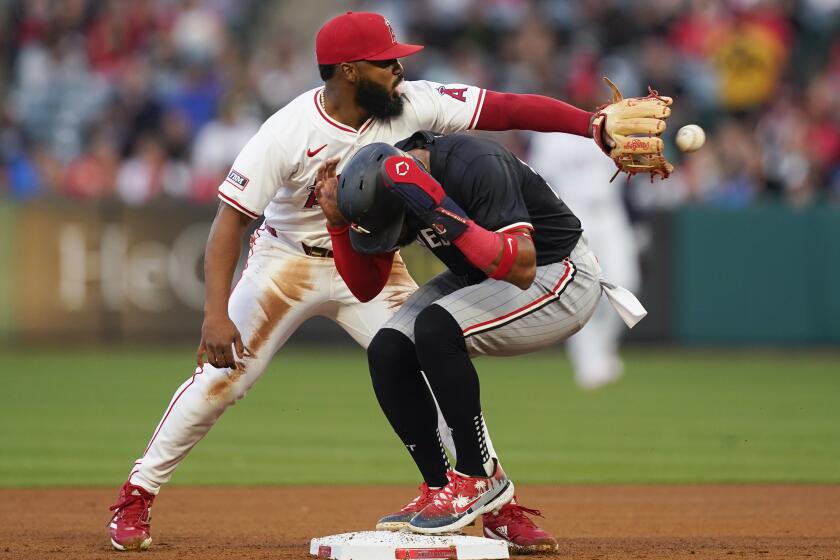Judge declares mistrial in Roger Clemens perjury case
The judge in the Roger Clemens federal perjury trial abruptly declared a mistrial on the second day of testimony after the government inadvertently allowed the jury to hear statements from a U.S. congressman discussing the credibility of one of the key witnesses against the former All-Star baseball pitcher.
U.S. District Judge Reggie Walton was livid Thursday that a video screen was left on in the courtroom while he and the lawyers privately discussed an issue away from the jury, and yet the jurors could clearly see written comments by U.S. Rep. Elijah E. Cummings (D-Md.) during a 2008 House hearing in which Clemens testified he never used steroids or other enhancement drugs.
“Sadly, I have reached this conclusion,” Walton said.
At issue was an earlier ruling in which the judge said he would not allow outside testimony or evidence from others about the credibility of certain key witnesses, including Andy Pettitte, a former teammate of Clemens.
Yet appearing on the screen was a transcript of comments by Cummings discussing Pettitte’s wife and Pettitte’s credibility as one of the lead government witnesses against the seven-time Cy Young award winner.
The government was supposed to have redacted such comments, and was instructed to keep them away from the jury of 10 women and two men so as not to prejudice their deliberations.
“We’ll never know what impact that will have on how this jury decides this case, when we have a man’s liberty’s at stake,” said Walton, visibly angry. “I am troubled by this. The government should have been more cautious.”
He added, “I don’t see how I unring the bell” and keep the jury from considering what Pettitte’s wife said and what Cummings thought of it.
“In my view, Mr. Pettitte’s testimony is going to be critical as to whether this man goes to prison, and I can’t in good faith leave this case where a man’s liberty is at risk when the government should have assured we are not in this situation.”
Prosecutors said the error was inadvertent. But Rusty Hardin of Houston, Clemens’ chief defense attorney, seized on the problem and immediately asked for a mistrial.
“I like this jury,” he said. “But…”
On the screen were written comments from Cummings discussing how Laura Pettitte has said her husband “told me he had a conversation with Roger Clemens and Roger admitted to him using human growth hormones.” Clemens has insisted he never told Pettitte that he used HGH or steroids, even though his friend and former New York Yankees teammate has said otherwise.
Yet Cummings, from his comments, seemed to believe Pettitte over Clemens.
Cummings’ comments were then addressed to Clemens, and his sworn statements that he never told Pettitte he used the drugs.
“If that were true,” Cummings’ comments continued on the video, “why would Laura Pettitte remember her husband telling her about that?”
Clemens had been charged with perjury, obstruction of justice and making false statements in the latest criminal trial dealing with Major League Baseball players and steroids and other enhancement drugs.
Before ending the trial, the judge left the bench to confer about what to do. But he severely admonished the prosecutors.
“Government counsel doesn’t do just what government counsel can get away with doing,” he said. “And a first-year law student knows you can’t alter the credibility of one witness with clearly inadmissible evidence.”
A chagrined judge then dismissed the jury.
“Ladies and gentlemen,” he told jurors, “we have taken about a week out of your life. We expended a lot of your taxpayers money to reach this point. Unfortunately there are rules we play by and those rules are designed to insure that both parties receive a fair trial.”
The judge continued a gag order precluding Clemens and attorneys and prosecutors discussing the case -- at least until a hearing on Sept. 2 to decide how or whether to jump start the case.
As he left the courtroom, Hardin said, “I would have liked to have gone forward. But we just didn’t have a choice.”
Richard.serrano@latimes.com
More to Read
Get our high school sports newsletter
Prep Rally is devoted to the SoCal high school sports experience, bringing you scores, stories and a behind-the-scenes look at what makes prep sports so popular.
You may occasionally receive promotional content from the Los Angeles Times.







